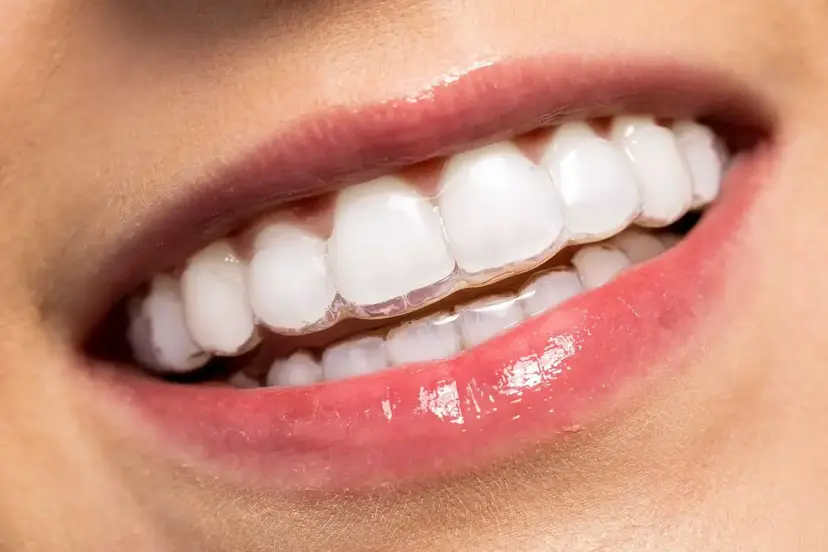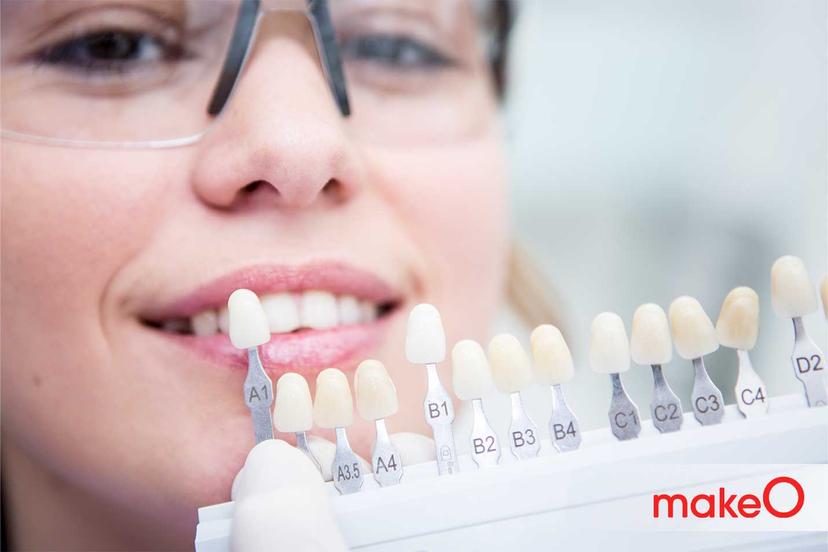MakeO blog
Introduction
Have you noticed black stains on your child’s teeth? These stains are not just cosmetic; they can indicate underlying oral health issues. Teeth staining refers to any change in the color or appearance of teeth, often caused by various factors such as poor oral hygiene, certain foods, drinks, medications, or even genetic conditions. In particular, black stains occur due to changes in the oral environment causing an increase in staining (chromogenic) bacteria present in the mouth or due to poor oral hygiene.
In this blog, we’ll explore what causes stained teeth, especially black stains, and how you can prevent or treat them. Read on to learn more about maintaining your child’s bright smile!
Understanding the Causes of Black Stains on Children's Teeth
Black stains on children’s teeth can occur for several reasons, and identifying the cause is essential for effective treatment. Common causes include:
Chromogenic bacteria: Certain bacteria, like Porphyromonas gingivalis, Actinomyces, and Prevotella melaninogenicus, interact with iron found in saliva and gum fluids. This creates a dark-pigmented substance known as ferric sulfide, which causes black stains on the teeth. Bleeding from gums that form deposits on teeth, high iron intake from supplements, water or iron-rich foods, or a high salivary pH are some of the proposed contributors to this phenomenon.
Poor Oral Care: One of the primary causes of black stains is inadequate oral health care such as not brushing and flossing properly. When kids do not clean their teeth properly, plaque builds up. If plaque is not removed, it hardens into tartar, which can lead to dark spots or stains on the teeth. Plaque also promotes bacterial growth on the teeth, further leading to staining.
Misaligned teeth can also make brushing and flossing more challenging for children, contributing to plaque and teeth stains.
Foods and Drinks: Certain foods and drinks can also stain teeth. Beverages like cola, tea, and coffee, as well as foods such as fruit juices, and berries, can leave dark marks on the teeth. If these are consumed frequently, the stains can be difficult to remove without regular cleaning. Additionally, drinking water with high iron content can also lead to black stains, especially if the child does not brush afterward.
Medications: Some medications, like liquid iron supplements, can cause dark stains on teeth. The iron reacts with the tooth surface, particularly if the child does not rinse their mouth afterward.
Injury to Teeth: In cases where a child’s tooth gets injured, it can result in internal bleeding and cause the tooth to darken.
Identifying the cause of black stains is crucial for effective prevention and treatment, ensuring your child's smile remains healthy and bright.
How Poor Oral Hygiene Contributes to Teeth Stains and its Consequences
Poor oral hygiene significantly contributes to tooth discoloration, especially in children. When children do not brush or floss their teeth properly, plaque and food particles build up on the teeth. Plaque, combined with a diet high in sugar or unhealthy foods, makes the teeth more susceptible to stains. When plaque accumulates, it increases the risk of developing tooth decay, which can be seen as black spots on teeth in the initial stages. Moreover, as plaque hardens to form a calculus, food particles sticking to it can cause your teeth to become black-stained.
Plaque also plays a key role in attracting bacteria like Actinomyces and Prevotella melaninogenica, which produce pigments that cause black stains on teeth. The plaque can also trap iron from saliva; when bacteria mix with it, they form compounds that lead to discoloration. These bacterial colonies, especially near the gumline, are the main cause of chromogenic staining, resulting in dark spots on the teeth over time.
Inadequate brushing and flossing leading to plaque build-up can cause bigger dental issues. One common problem caused by poor oral hygiene in children is Early Childhood Caries (ECC), which can lead to tooth pain, cavities, and infections. If untreated, ECC can damage both baby and permanent teeth, affecting speech, eating, and overall quality of life.8 Additionally, plaque and calculus also increase the risk of gum disease by two to five times. It may potentially lead to inflammation and infection in the gums resulting in tooth loss.
Preventive Measures to be taken by Caregivers
To help prevent black stains in the teeth of children, caregivers should follow some simple steps:
Brush Teeth Regularly: Brush your child's teeth two to three times a day using a soft-bristled toothbrush and fluoride toothpaste. For children under 3 years, use a small smear of toothpaste, and for older kids, a pea-sized amount is sufficient.
Floss Daily: Once your child has teeth that touch, help them floss once a day to remove food and plaque that can cause staining.
Orthodontic Correction: When teeth are uneven, food and plaque get trapped in the gaps, leading to poor oral hygiene and black stains. Treatments like kid's invisible braces that straighten the teeth can help maintain proper oral care more easily and prevent future problems.
Drink Water: Encourage your child to drink plenty of water, especially after meals, to help rinse away food particles and keep their teeth clean.
**Dietary Adjustments: ** Avoid foods and drinks that cause stains, such as tea, coffee, and sodas. These can lead to tooth discoloration. Reducing iron supplements or iron-rich foods, when possible, can help prevent black stains. A balanced diet with plenty of fresh fruits and vegetables supports healthy teeth.
Regular Dentist Visits: Schedule routine dental check-ups and cleanings to maintain your child's oral health and prevent plaque buildup.
By following these steps, caregivers can help their children maintain bright, healthy teeth and reduce the risk of black stains.
Effective Solutions and Treatments for Removing Black Stains in Children
Black stains on children's teeth can be concerning, but there are many ways to treat and remove them. Here are some common treatments:
Professional Cleanings: Dentists use special tools to carefully clean and polish teeth, removing stains caused by plaque and bacteria. Air polishing, which involves spraying fine abrasive powders, is a safe method for removing stubborn stains without damaging the enamel.
Laser Therapy: Advanced treatments like laser therapy can effectively eliminate black stains. These lasers reduce bacterial buildup and help maintain clean teeth for months, with minimal risk of stains returning.
Probiotic Solutions: Specific probiotics such as Streptococcus salivarius M18 help restore healthy bacteria in the mouth. These probiotics prevent new stains from forming and can keep teeth stain-free for up to three months
Fluoride Treatment: Fluoride makes enamel stronger and can help prevent stains and decay. It can be used by the dentist or at home with special toothpaste or mouth rinses. This is especially helpful if the stains are from weak enamel.
Microabrasion: If the stains are deep, microabrasion might be used. This treatment removes a tiny layer of stained enamel using special chemicals and gentle abrasives. It works well for tougher stains that brushing cannot fix.
These treatments, combined with good brushing habits and diet can help make teeth look better. A pediatric dentist can decide the best treatment for your child, based on what is causing the stains.
Conclusion
Black stains on your child's teeth can be prevented and treated with good oral hygiene, promoting healthy habits and food choices, and regular dentist visits. By understanding the causes of staining, you can help keep your child's smile bright. Consistent care and early treatment are essential for maintaining their dental health and preventing further issues.
FAQs
1. What causes black stains on children's teeth?
Black stains on children's teeth are primarily caused by chromogenic bacteria interacting with iron in saliva, forming ferric compounds like ferric sulfide. Poor oral hygiene and diet contribute to this process. Other causes include medications and excessive iron consumption.
2. Can poor oral hygiene lead to black stains?
Yes, inadequate brushing allows plaque to turn into tartar, causing black stains. Bacteria from plaque worsen discoloration and increase the risk of gum issues.
3. Are black stains on teeth permanent?
No, most black stains can be managed with proper oral hygiene practices and professional dental cleaning. However, they tend to reappear.
4. How can I prevent black stains on children's teeth?
Ensure daily brushing, and flossing, limit staining foods and drinks, encourage water intake after meals, and schedule regular dental visits to prevent plaque buildup and discoloration.
5. How to remove black stains from teeth?
To remove black stains from children's teeth, treatments like professional cleanings, laser therapy, probiotic solutions, and enhancing salivary proteins can effectively eliminate stains and prevent recurrence.
6. Does tooth discoloration in kids mean there is a health problem?
Not always though, but in some cases, tooth discoloration can be a sign of health issues like enamel defects, nutritional deficiencies, or infections. Regular dental checkups help identify and address these concerns early.
7. When should I take my child to the dentist for black teeth?
Visit the dentist if stains worsen, persist, or cause pain or sensitivity, despite good brushing and oral hygiene habits.1
related categories
Related articles

Types of Braces: Removable vs Fixed Braces, Which is Right For You?

This Diwali, Smile Bright With makeO Teeth Whitening Kit

Dr. Pravin Shetty: Pioneer in Lingual Orthodontics & Innovative Smile Solutions
How do I Know I’m the Right Candidate for makeO toothsi Teeth Aligners?

